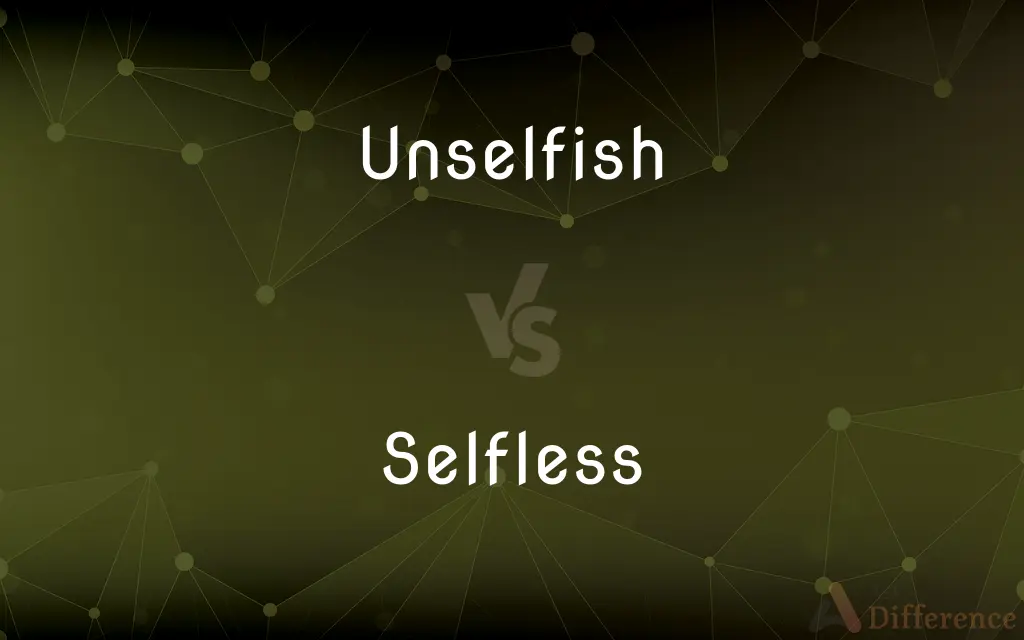Unselfish vs. Selfless — What's the Difference?
By Fiza Rafique & Maham Liaqat — Updated on April 14, 2024
Unselfish behavior involves putting others' needs before one's own, often considering fairness, whereas selfless acts are characterized by a complete disregard for oneself.

Difference Between Unselfish and Selfless
Table of Contents
ADVERTISEMENT
Key Differences
Unselfish individuals often prioritize others' needs but may still maintain some concern for their own welfare or benefits. Whereas, selfless people act with no regard for their own gains, focusing solely on the benefits to others.
Unselfishness can be seen in sharing resources fairly, ensuring both personal and others' needs are met. On the other hand, selflessness involves giving without any thought of receiving anything in return, even at a personal cost.
Unselfish actions are typically motivated by a sense of duty or fairness in social exchanges. While, selfless behavior is driven by pure altruism, often going beyond basic fairness to alleviate the suffering or enhance the joy of others.
Unselfish people are admired for their balanced approach to personal and communal welfare. Whereas, selfless individuals are often celebrated as exemplary figures, epitomizing extreme altruism.
Unselfish actions might include letting someone else have the last piece of cake. In contrast, selfless actions could extend to donating one’s meal to ensure another can eat.
ADVERTISEMENT
Comparison Chart
Focus on Self
Minimal but present
Absent
Motivation
Fairness, reciprocity
Altruism, compassion
Outcome Consideration
Balances own needs with others'
Prioritizes others' needs exclusively
Typical Actions
Sharing, compromising
Sacrificing, giving up personal benefits
Perception
Positive, community-oriented
Highly admirable, often seen as heroic
Compare with Definitions
Unselfish
Acts with fairness and generosity.
Her unselfish decision allowed her teammates to shine.
Selfless
Gives without any expectation of return.
She made a selfless contribution to the charity.
Unselfish
Shares resources or time without seeking equality.
His unselfish donation helped the school’s renovation project.
Selfless
Exhibits extreme altruism.
Her selfless hours volunteering at the shelter define her character.
Unselfish
Balances own interests with those of others.
She chose the movie everyone else wanted to see, showing her unselfish nature.
Selfless
Acts entirely without regard for self.
His selfless work in the community was recognized with a humanitarian award.
Unselfish
Recognizes and supports the welfare of others.
He offered his seat on the bus, an unselfish act of kindness.
Selfless
Puts others’ well-being before personal welfare.
He rushed into the burning building in a selfless act to save the dog.
Unselfish
Prioritizes others’ needs while considering personal benefits.
She was unselfish in dividing the project tasks, ensuring everyone’s strengths were utilized.
Selfless
Often associated with heroic or saintly behavior.
The firefighter’s selfless bravery saved lives.
Unselfish
Willing to put the needs or wishes of others before one's own
Unselfish devotion
Selfless
Concerned more with the needs and wishes of others than with one's own; unselfish
An act of selfless devotion
Unselfish
Generous or altruistic.
Selfless
Having, exhibiting, or motivated by no concern for oneself; unselfish
A selfless act of charity.
Unselfish
Not selfish
The man was in an unselfish mood that day, so decided to give a £20 note to the next charity he came across.
Selfless
Having no regard to self; unselfish.
Lo now, what hearts have men! they never mountAs high as woman in her selfless mood.
Unselfish
Not selfish
Selfless
Showing unselfish concern for the welfare of others
Unselfish
Not greedy
Common Curiosities
What differentiates unselfish from selfless behavior?
Unselfish behavior involves some consideration for personal benefit, while selfless behavior disregards one's own benefit entirely.
Is selfless behavior always more valued than unselfish behavior?
While selfless behavior is often seen as more noble, both are valued depending on cultural and contextual factors.
Can unselfishness and selflessness coexist in one person?
Yes, a person can display both unselfish and selfless behaviors depending on the situation.
Do unselfish and selfless behaviors have psychological benefits?
Yes, both behaviors can increase personal satisfaction, improve mental health, and strengthen community bonds.
Can unselfish acts lead to selfless behavior?
Yes, regularly practicing unselfishness can evolve into more selfless attitudes and actions.
How do societies benefit from unselfish and selfless behaviors?
Both behaviors promote communal welfare and support social harmony.
How do children learn unselfish and selfless behaviors?
Children learn these behaviors through parental modeling, social interactions, and educational settings that emphasize sharing and caring.
Is it possible for selfless actions to be detrimental to the individual?
Yes, excessively selfless behavior can sometimes lead to neglect of one's own needs, resulting in burnout or other negative health impacts.
What are some common examples of unselfish behavior?
Sharing resources, helping others without expecting anything in return, and making decisions that benefit group dynamics are typical examples.
Are there any historical figures known for their unselfish or selfless behavior?
Numerous figures like Mother Teresa for her selfless service to the poor and Mahatma Gandhi for his unselfish commitment to social justice are celebrated for their exemplary behaviors.
What are typical contexts in which selfless behavior is observed?
Selfless behavior is often observed in emergency situations, in caregiving roles, or when individuals volunteer for humanitarian causes.
What is the role of culture in shaping perceptions of unselfish versus selfless behaviors?
Cultural values and societal norms significantly influence how unselfish and selfless behaviors are perceived and practiced, with some cultures placing more emphasis on communal harmony and others on individual sacrifice.
How do religions typically view unselfish and selfless behavior?
Most religions highly value both behaviors, often associating them with virtues or spiritual ideals such as compassion and sacrifice.
Can unselfish behavior be taught in organizational settings?
Yes, organizational cultures that encourage teamwork, recognition of mutual benefits, and ethical practices can foster unselfish behavior among employees.
What impact do unselfish and selfless behaviors have on leadership?
Leaders who exhibit these behaviors are often seen as more credible and trustworthy, which can enhance team loyalty and cooperation.
Share Your Discovery

Previous Comparison
Carbonite vs. Carbonate
Next Comparison
Efficient vs. QuickAuthor Spotlight
Written by
Fiza RafiqueFiza Rafique is a skilled content writer at AskDifference.com, where she meticulously refines and enhances written pieces. Drawing from her vast editorial expertise, Fiza ensures clarity, accuracy, and precision in every article. Passionate about language, she continually seeks to elevate the quality of content for readers worldwide.
Co-written by
Maham Liaqat















































